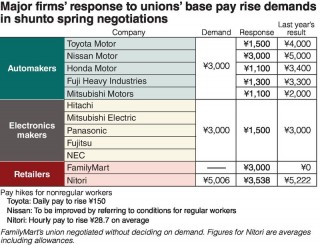Loading
Search
▼ Big Birms Offer Unions Modest Pay-scale Hike
- Category:Other
The Yomiuri Shimbun
The 2016 shunto wage negotiations at many major automakers and electronics manufacturers reached a climax on Wednesday, with the management giving their responses to the labor unions’ demands. This year, a large number of companies will raise base pay for the third straight year, but many of the wage increase levels offered Wednesday were lower than the previous year amid uncertainty about the future of their businesses.
More firms are moving to reduce the wage gap between regular and nonregular employees, with some of the major automakers considering raising daily pay for nonregular staff.
Toyota Motor Corp., Japan’s leading manufacturer, on Wednesday offered the labor union a monthly pay scale hike of ¥1,500 — ¥2,500 less than the previous year’s level and the lowest since 2014, when the government of Prime Minister Shinzo Abe started strongly requesting businesses raise wages in shunto talks.
In the 2016 shunto negotiations, the labor unions of Toyota and other automakers had sought a pay scale hike of ¥3,000 per month, half the level they demanded last year.
As Toyota is expected to post a record high operating profit in the fiscal year ending this month, the labor unions and management had talks to set a base pay hike of ¥2,000 or more. However, concerns grew within the management as, if they agree on a level that is too high for auto parts makers and car dealers to follow, “a sense of unity [of the Toyota-related firms] will be hindered,” an executive of the company said.
Other major automakers tend to decide on wage hikes on their own by taking the leading firm’s standard into consideration. This year, “collaterally dragged down by the Toyota offer” as explained by an executive member of a labor union, most of the automakers offered a pay scale hike at a level much lower than the previous year.
For example, Honda Motor Co. set out an increase of ¥1,100 per month — lower than the ¥3,400 of last year. As an exception, Nissan Motor Co. agreed to the full amount of a base pay hike demanded by the labor side as its wage system is largely different from other automakers.
Major electronics manufacturers, including Hitachi, Ltd., offered in unison a monthly base pay increase of ¥1,500, half of that of last year and less than the initially expected amount of ¥2,000. The industry has a practice of adopting a unified level for wage increases, and this year they are believed to have decided on the figure by factoring the sluggish business of Fujitsu Ltd. and NEC Corp., for example, into the calculation.
The 2016 shunto wage negotiations at many major automakers and electronics manufacturers reached a climax on Wednesday, with the management giving their responses to the labor unions’ demands. This year, a large number of companies will raise base pay for the third straight year, but many of the wage increase levels offered Wednesday were lower than the previous year amid uncertainty about the future of their businesses.
More firms are moving to reduce the wage gap between regular and nonregular employees, with some of the major automakers considering raising daily pay for nonregular staff.
Toyota Motor Corp., Japan’s leading manufacturer, on Wednesday offered the labor union a monthly pay scale hike of ¥1,500 — ¥2,500 less than the previous year’s level and the lowest since 2014, when the government of Prime Minister Shinzo Abe started strongly requesting businesses raise wages in shunto talks.
In the 2016 shunto negotiations, the labor unions of Toyota and other automakers had sought a pay scale hike of ¥3,000 per month, half the level they demanded last year.
As Toyota is expected to post a record high operating profit in the fiscal year ending this month, the labor unions and management had talks to set a base pay hike of ¥2,000 or more. However, concerns grew within the management as, if they agree on a level that is too high for auto parts makers and car dealers to follow, “a sense of unity [of the Toyota-related firms] will be hindered,” an executive of the company said.
Other major automakers tend to decide on wage hikes on their own by taking the leading firm’s standard into consideration. This year, “collaterally dragged down by the Toyota offer” as explained by an executive member of a labor union, most of the automakers offered a pay scale hike at a level much lower than the previous year.
For example, Honda Motor Co. set out an increase of ¥1,100 per month — lower than the ¥3,400 of last year. As an exception, Nissan Motor Co. agreed to the full amount of a base pay hike demanded by the labor side as its wage system is largely different from other automakers.
Major electronics manufacturers, including Hitachi, Ltd., offered in unison a monthly base pay increase of ¥1,500, half of that of last year and less than the initially expected amount of ¥2,000. The industry has a practice of adopting a unified level for wage increases, and this year they are believed to have decided on the figure by factoring the sluggish business of Fujitsu Ltd. and NEC Corp., for example, into the calculation.
- March 18, 2016
- Comment (0)
- Trackback(0)


